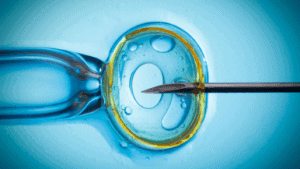In vitro fertilization (IVF) has been helping women and couples overcome fertility challenges for almost 40 years. Up until recently, IVF has traditionally used fresh eggs retrieved from a woman, which were fertilized ‘in vitro’ in a laboratory with a spouse’s or donor’s sperm to create an embryo. The embryo was then transplanted back into the woman’s uterus to initiate a pregnancy.
The history of egg retrieval dates back as many as seven decades, but during that time, egg freezing for future use had been slower to receive official recognition by medical authorities as a viable fertility preservation option.
“Over my career, the most exciting advance in reproductive medicine has been in the area of preserving fertility, and what this involves is egg freezing.” says Mark P. Trolice, M.D., board certified reproductive endocrinology and infertility specialist and founder of The IVF Center.
Benefits of Egg Retrieval
Egg retrieval is an intricate process that can take up to six weeks to complete. During that time, a woman will undergo a full examination and evaluation of her reproductive system.
 When fertility doctors remove the eggs, they have the opportunity to analyze and review a woman’s reproductive capacity. This gives women access to detailed personal medical information as well as a much greater understanding of their own eggs.
When fertility doctors remove the eggs, they have the opportunity to analyze and review a woman’s reproductive capacity. This gives women access to detailed personal medical information as well as a much greater understanding of their own eggs.
For women who have a spouse but don’t feel ready to have children, harvesting eggs and then spawning embryos for freezing can provide an empowering alternative for them to take control of their fertility, and enhance their chances of having a successful pregnancy in the future.
Because of their fragile nature, not all eggs will survive the thawing process. Blending harvested eggs with their partner’s sperm and then freezing the emerging embryos will allow couples to eliminate one critical step in the process.
Who Can Benefit from Egg Freezing?
“A lot of those cancer patients are turning to us to preserve their fertility by removing eggs and freezing them, or freezing embryos if they have a partner,” says Dr. Trolice.
He says egg freezing also provides fertility flexibility for many healthy women. “Young women that don’t have a disease but are concerned about their biological clock will also come to us to freeze their eggs,” he says. “As women get older, their egg number and egg quality declines. If they have eggs frozen it’s somewhat (like an) insurance for them. And what we’re seeing is increasing success in using frozen eggs, which can be frozen indefinitely, success similar to (that of) fresh eggs.”
Women aren’t the only ones who can benefit from advanced freezing techniques.
“Men are able to do this as well,” says Dr. Trolice. “We’ve been freezing sperm decades before we had the technology to do it successfully in women. All this is available to you and to empower you to preserve your fertility.”





